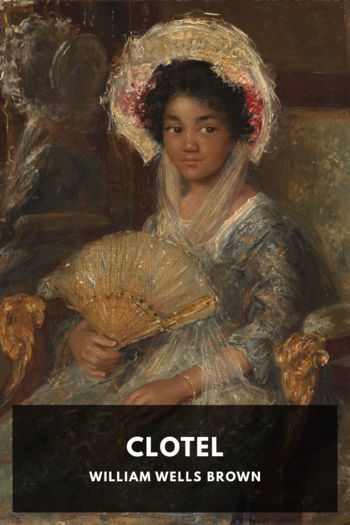Clotel, William Wells Brown [i like reading books .txt] 📗

- Author: William Wells Brown
Book online «Clotel, William Wells Brown [i like reading books .txt] 📗». Author William Wells Brown
“Georgiana, my dear, you are an abolitionist; your talk is fanaticism,” said Mr. Peck in rather a sharp tone; but the subdued look of the girl, and the presence of Carlton, caused the father to soften his language. Mr. Peck having lost his wife by consumption, and Georgiana being his only child, he loved her too dearly to say more, even if he felt displeased. A silence followed this exhortation from the young Christian. But her remarks had done a noble work. The father’s heart was touched; and the sceptic, for the first time, was viewing Christianity in its true light.
“I think I must go out to your farm,” said Carlton, as if to break the silence.
“I shall be pleased to have you go,” returned Mr. Peck. “I am sorry I can’t go myself, but Huckelby will show you every attention; and I feel confident that when you return to Connecticut, you will do me the justice to say, that I am one who looks after my people, in a moral, social, and religious point of view.”
“Well, what do you say to my spending next Sunday there?”
“Why, I think that a good move; you will then meet with Snyder, our missionary.”
“Oh, you have missionaries in these parts, have you?”
“Yes,” replied Mr. Peck; “Snyder is from New York, and is our missionary to the poor, and preaches to our ‘people’ on Sunday; you will no doubt like him; he is a capital fellow.”
“Then I shall go,” said Carlton, “but only wish I had company.” This last remark was intended for Miss Peck, for whom he had the highest admiration.
It was on a warm Sunday morning, in the month of May, that Miles Carlton found himself seated beneath a fine old apple tree, whose thick leaves entirely shaded the ground for some distance round. Under similar trees and near by, were gathered together all the “people” belonging to the plantation. Hontz Snyder was a man of about forty years of age, exceedingly low in stature, but of a large frame. He had been brought up in the Mohawk Valley, in the state of New York, and claimed relationship with the oldest Dutch families in that vicinity. He had once been a sailor, and had all the roughness of character that a seafaring man might expect to possess; together with the half-Yankee, half-German peculiarities of the people of the Mohawk Valley. It was nearly eleven o’clock when a one-horse wagon drove up in haste, and the low squatty preacher got out and took his place at the foot of one of the trees, where a sort of rough board table was placed, and took his books from his pocket and commenced.
“As it is rather late,” said he, “we will leave the singing and praying for the last, and take our text, and commence immediately. I shall base my remarks on the following passage of Scripture, and hope to have that attention which is due to the cause of God:—‘All things whatsoever ye would that men should do unto you, do ye even so unto them’; that is, do by all mankind just as you would desire they should do by you, if you were in their place and they in yours.
“Now, to suit this rule to your particular circumstances, suppose you were masters and mistresses, and had servants under you, would you not desire that your servants should do their business faithfully and honestly, as well when your back was turned as while you were looking over them? Would you not expect that they should take notice of what you said to them? that they should behave themselves with respect towards you and yours, and be as careful of everything belonging to you as you would be yourselves? You are servants: do, therefore, as you would wish to be done by, and you will be both good servants to your masters and good servants to God, who requires this of you, and will reward you well for it, if you do it for the sake of conscience, in obedience to his commands.
“You are not to be eye-servants. Now, eye-servants are such as will work hard, and seem mighty diligent, while they think anybody is taking notice of them; but, when their masters’ and mistresses’ backs are turned, they are idle and neglect their business. I am afraid there are a great many such eye-servants among you, and that you do not consider how great a sin it is to be so, and how severely God will punish you for it. You may easily deceive your owners, and make them have an opinion of you that you do not deserve, and get the praise of men by it; but remember that you cannot deceive Almighty God, who sees your





Comments (0)